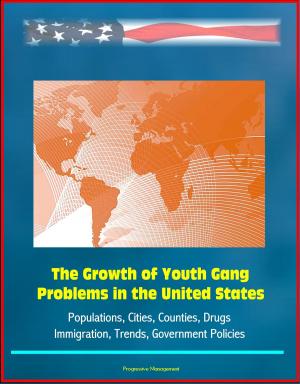FBI Report: Financial Crimes, Corporate Fraud, Securities and Commodities, Health Care, Mortgage, Insurance, Mass Marketing, Money Laundering, Forensic Accountant, Financial Intelligence
Nonfiction, Social & Cultural Studies, True Crime| Author: | Progressive Management | ISBN: | 9781301329984 |
| Publisher: | Progressive Management | Publication: | April 12, 2013 |
| Imprint: | Smashwords Edition | Language: | English |
| Author: | Progressive Management |
| ISBN: | 9781301329984 |
| Publisher: | Progressive Management |
| Publication: | April 12, 2013 |
| Imprint: | Smashwords Edition |
| Language: | English |
The Federal Bureau of Investigation (FBI) investigates matters relating to fraud, theft, or embezzlement occurring within or against the national and international financial community. These crimes are characterized by deceit, concealment, or violation of trust and are not dependent upon the application or threat of physical force or violence. Such acts are committed by individuals and organizations to obtain personal or business advantage. The FBI focuses its financial crimes investigations on such criminal activities as corporate fraud, securities and commodities fraud, health care fraud, financial institution fraud, mortgage fraud, insurance fraud, mass marketing fraud, and money laundering. These are the identified priority crime problem areas of the Financial Crimes Section (FCS) of the FBI.
Financial Crimes * Corporate Fraud * Securities and Commodities Fraud * Health Care Fraud * Mortgage Fraud * Financial Institution Fraud * Financial Institution Failures * Insurance Fraud * Mass Marketing Fraud * Asset Forfeiture/Money Laundering * Forensic Accountant Program * Financial Intelligence Center * Acronyms * Report: Financial Crime and You
As the lead agency investigating corporate fraud, the FBI has focused its efforts on cases which involve accounting schemes, self-dealing by corporate executives, and obstruction of justice. The majority of corporate fraud cases pursued by the FBI involve accounting schemes designed to deceive investors, auditors, and analysts about the true financial condition of a corporation or business entity. Through the manipulation of financial data, the share price, or other valuation measurements of a corporation, financial performance may remain artificially inflated based on fictitious performance indicators provided to the investing public. In addition to significant financial losses to investors, corporate fraud has the potential to cause immeasurable damage to the U.S. economy and investor confidence.
While the number of cases involving the falsification of financial information remains relatively stable, the FBI has observed an increase in the number of insider trading cases. Insider trading has been a continuous threat to the fair and orderly operation of the U.S. financial markets and has robbed the investing public of some degree of trust that markets operate fairly. The dissemination of material, non-public information commonly referred to as insider information has also caused irreparable harm to victim institutions whose employees illegally pass privileged corporate information. The FBI has worked extensively with the U.S. Securities and Exchange Commission (SEC) to target the widespread problem of insider trading which has plagued the fair and orderly operation of the securities markets.
The Federal Bureau of Investigation (FBI) investigates matters relating to fraud, theft, or embezzlement occurring within or against the national and international financial community. These crimes are characterized by deceit, concealment, or violation of trust and are not dependent upon the application or threat of physical force or violence. Such acts are committed by individuals and organizations to obtain personal or business advantage. The FBI focuses its financial crimes investigations on such criminal activities as corporate fraud, securities and commodities fraud, health care fraud, financial institution fraud, mortgage fraud, insurance fraud, mass marketing fraud, and money laundering. These are the identified priority crime problem areas of the Financial Crimes Section (FCS) of the FBI.
Financial Crimes * Corporate Fraud * Securities and Commodities Fraud * Health Care Fraud * Mortgage Fraud * Financial Institution Fraud * Financial Institution Failures * Insurance Fraud * Mass Marketing Fraud * Asset Forfeiture/Money Laundering * Forensic Accountant Program * Financial Intelligence Center * Acronyms * Report: Financial Crime and You
As the lead agency investigating corporate fraud, the FBI has focused its efforts on cases which involve accounting schemes, self-dealing by corporate executives, and obstruction of justice. The majority of corporate fraud cases pursued by the FBI involve accounting schemes designed to deceive investors, auditors, and analysts about the true financial condition of a corporation or business entity. Through the manipulation of financial data, the share price, or other valuation measurements of a corporation, financial performance may remain artificially inflated based on fictitious performance indicators provided to the investing public. In addition to significant financial losses to investors, corporate fraud has the potential to cause immeasurable damage to the U.S. economy and investor confidence.
While the number of cases involving the falsification of financial information remains relatively stable, the FBI has observed an increase in the number of insider trading cases. Insider trading has been a continuous threat to the fair and orderly operation of the U.S. financial markets and has robbed the investing public of some degree of trust that markets operate fairly. The dissemination of material, non-public information commonly referred to as insider information has also caused irreparable harm to victim institutions whose employees illegally pass privileged corporate information. The FBI has worked extensively with the U.S. Securities and Exchange Commission (SEC) to target the widespread problem of insider trading which has plagued the fair and orderly operation of the securities markets.















